Five Factor Model's Role in Predicting Academic Performance Explored
VerifiedAdded on 2023/06/10
|10
|2488
|325
Essay
AI Summary
This essay critically analyzes the five-factor model of personality to determine its effectiveness in predicting academic performance. Through a detailed literature review, the study finds that while conscientiousness shows a positive correlation with academic success, other traits like neuroticism, extraversion, agreeableness, and openness are unreliable predictors due to inconsistencies across different educational levels and cultural contexts. The essay highlights the model's failure to account for psychosocial and cross-cultural factors, concluding that the five-factor model, excluding conscientiousness, is not a reliable predictor of academic performance. Desklib offers similar essays and study resources for students.
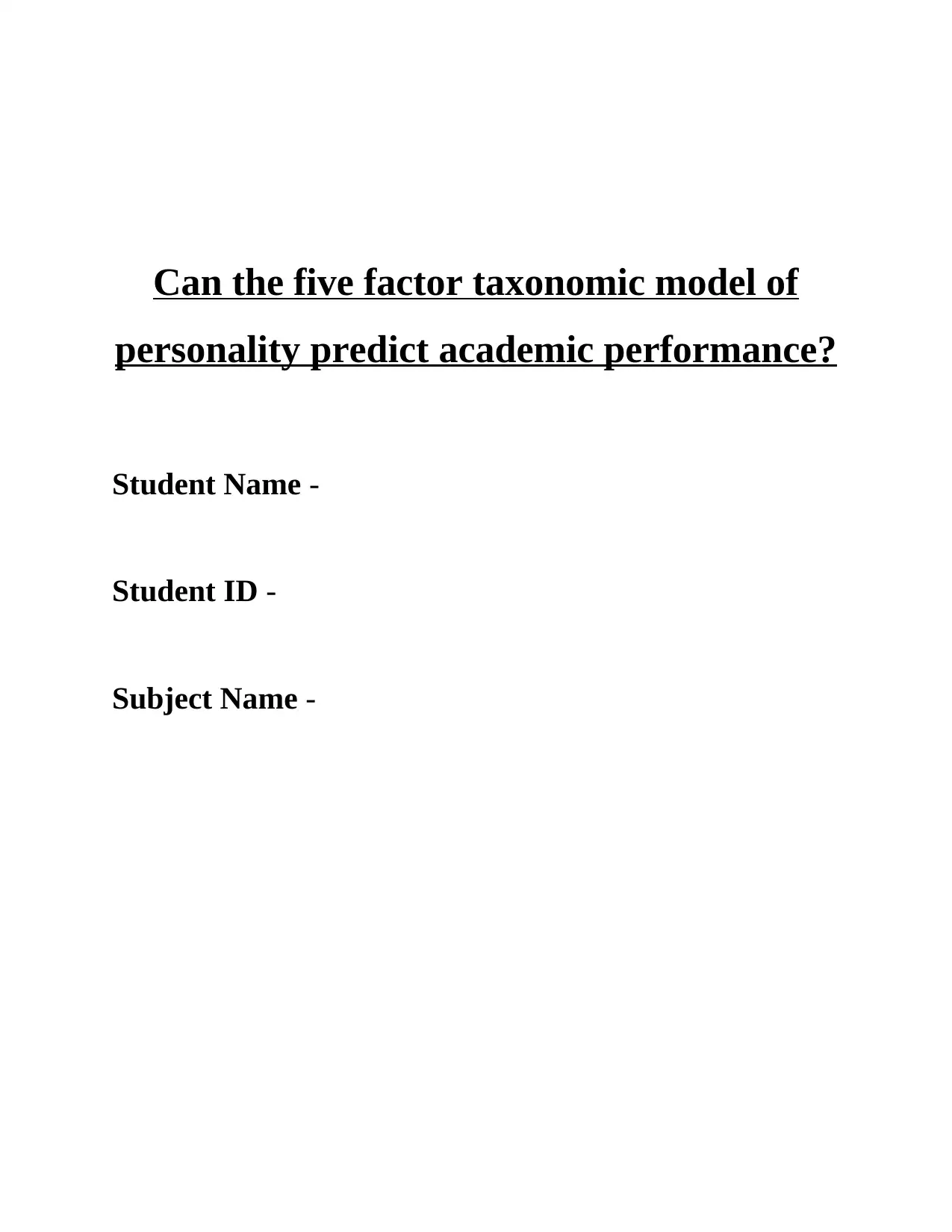
Can the five factor taxonomic model of
personality predict academic performance?
Student Name -
Student ID -
Subject Name -
personality predict academic performance?
Student Name -
Student ID -
Subject Name -
Paraphrase This Document
Need a fresh take? Get an instant paraphrase of this document with our AI Paraphraser
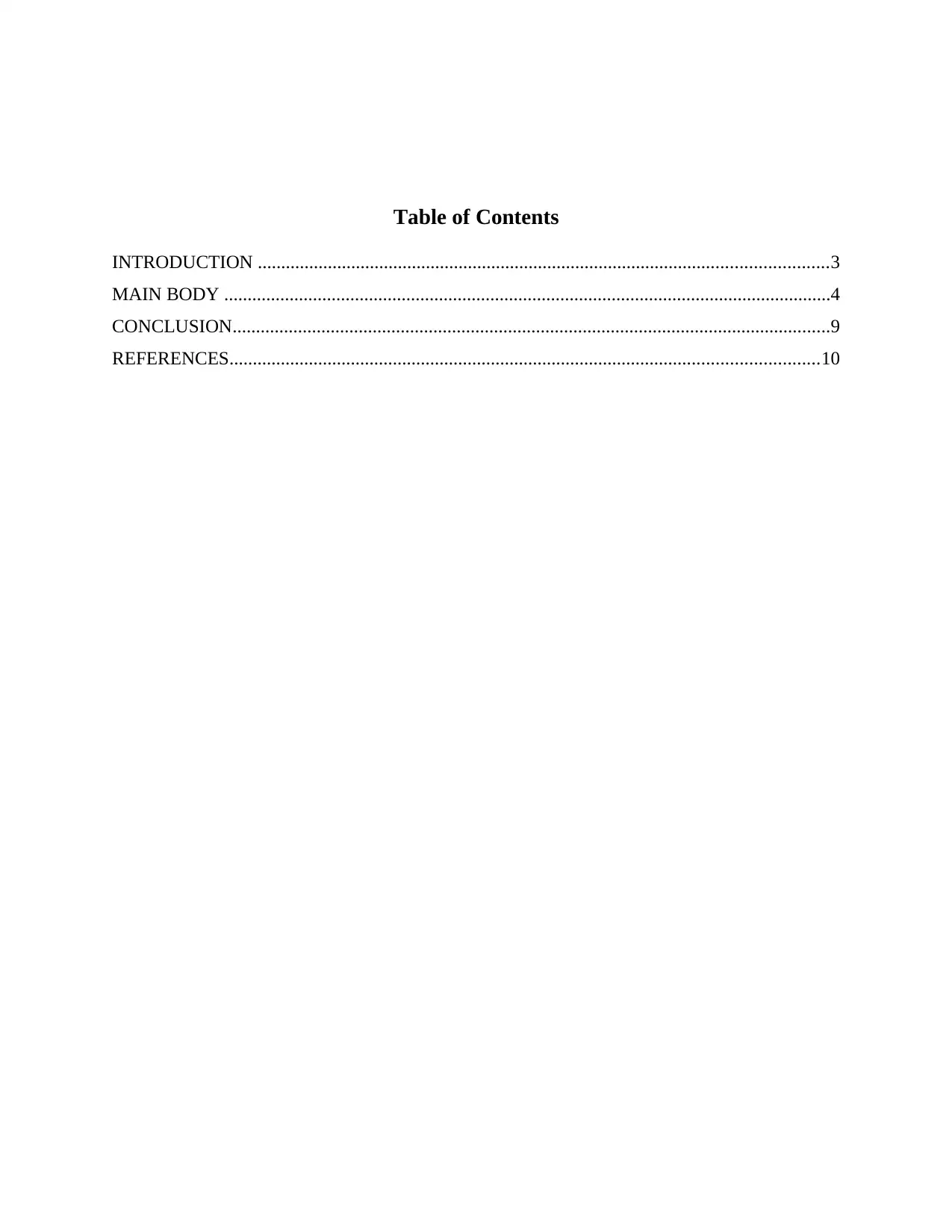
Table of Contents
INTRODUCTION ..........................................................................................................................3
MAIN BODY ..................................................................................................................................4
CONCLUSION................................................................................................................................9
REFERENCES..............................................................................................................................10
INTRODUCTION ..........................................................................................................................3
MAIN BODY ..................................................................................................................................4
CONCLUSION................................................................................................................................9
REFERENCES..............................................................................................................................10
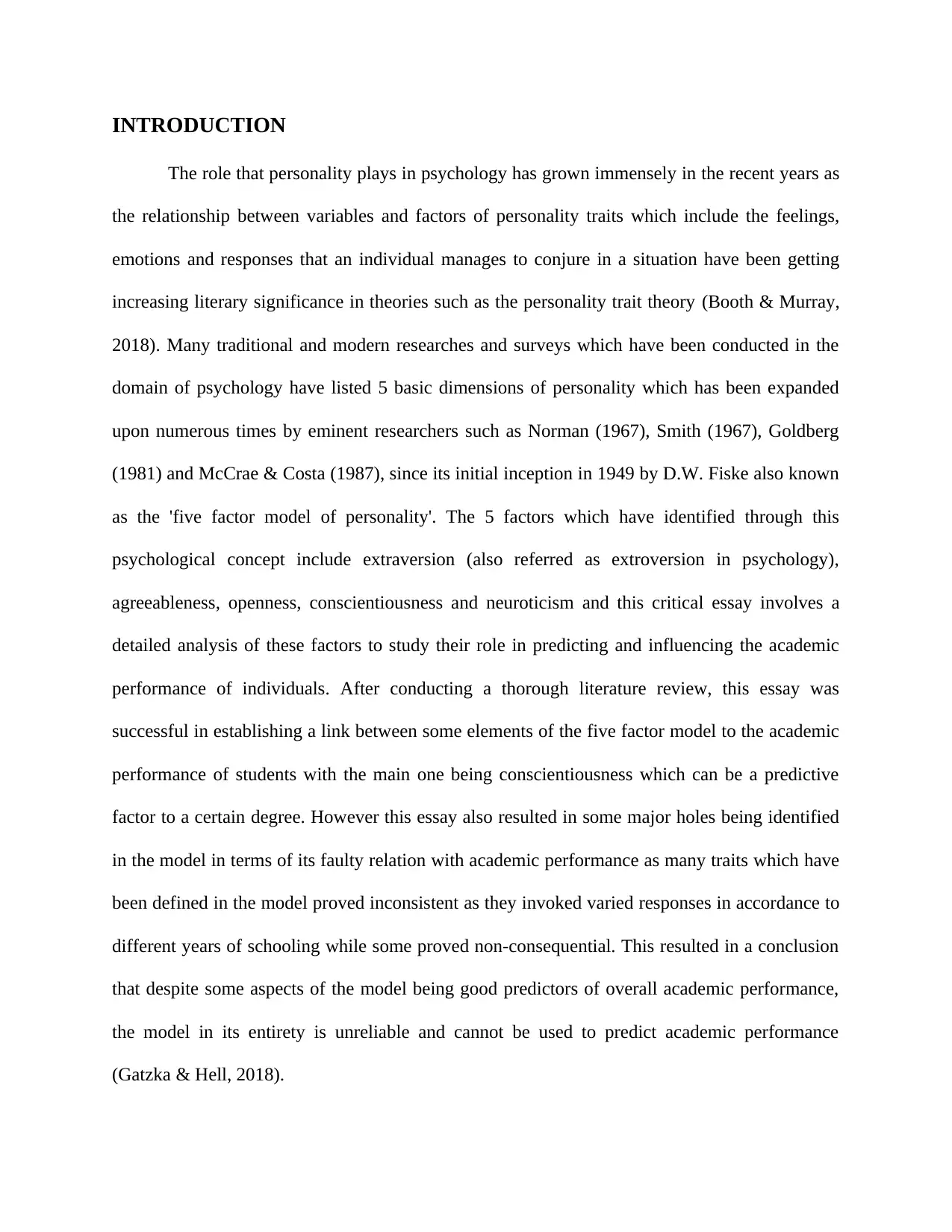
INTRODUCTION
The role that personality plays in psychology has grown immensely in the recent years as
the relationship between variables and factors of personality traits which include the feelings,
emotions and responses that an individual manages to conjure in a situation have been getting
increasing literary significance in theories such as the personality trait theory (Booth & Murray,
2018). Many traditional and modern researches and surveys which have been conducted in the
domain of psychology have listed 5 basic dimensions of personality which has been expanded
upon numerous times by eminent researchers such as Norman (1967), Smith (1967), Goldberg
(1981) and McCrae & Costa (1987), since its initial inception in 1949 by D.W. Fiske also known
as the 'five factor model of personality'. The 5 factors which have identified through this
psychological concept include extraversion (also referred as extroversion in psychology),
agreeableness, openness, conscientiousness and neuroticism and this critical essay involves a
detailed analysis of these factors to study their role in predicting and influencing the academic
performance of individuals. After conducting a thorough literature review, this essay was
successful in establishing a link between some elements of the five factor model to the academic
performance of students with the main one being conscientiousness which can be a predictive
factor to a certain degree. However this essay also resulted in some major holes being identified
in the model in terms of its faulty relation with academic performance as many traits which have
been defined in the model proved inconsistent as they invoked varied responses in accordance to
different years of schooling while some proved non-consequential. This resulted in a conclusion
that despite some aspects of the model being good predictors of overall academic performance,
the model in its entirety is unreliable and cannot be used to predict academic performance
(Gatzka & Hell, 2018).
The role that personality plays in psychology has grown immensely in the recent years as
the relationship between variables and factors of personality traits which include the feelings,
emotions and responses that an individual manages to conjure in a situation have been getting
increasing literary significance in theories such as the personality trait theory (Booth & Murray,
2018). Many traditional and modern researches and surveys which have been conducted in the
domain of psychology have listed 5 basic dimensions of personality which has been expanded
upon numerous times by eminent researchers such as Norman (1967), Smith (1967), Goldberg
(1981) and McCrae & Costa (1987), since its initial inception in 1949 by D.W. Fiske also known
as the 'five factor model of personality'. The 5 factors which have identified through this
psychological concept include extraversion (also referred as extroversion in psychology),
agreeableness, openness, conscientiousness and neuroticism and this critical essay involves a
detailed analysis of these factors to study their role in predicting and influencing the academic
performance of individuals. After conducting a thorough literature review, this essay was
successful in establishing a link between some elements of the five factor model to the academic
performance of students with the main one being conscientiousness which can be a predictive
factor to a certain degree. However this essay also resulted in some major holes being identified
in the model in terms of its faulty relation with academic performance as many traits which have
been defined in the model proved inconsistent as they invoked varied responses in accordance to
different years of schooling while some proved non-consequential. This resulted in a conclusion
that despite some aspects of the model being good predictors of overall academic performance,
the model in its entirety is unreliable and cannot be used to predict academic performance
(Gatzka & Hell, 2018).
⊘ This is a preview!⊘
Do you want full access?
Subscribe today to unlock all pages.

Trusted by 1+ million students worldwide
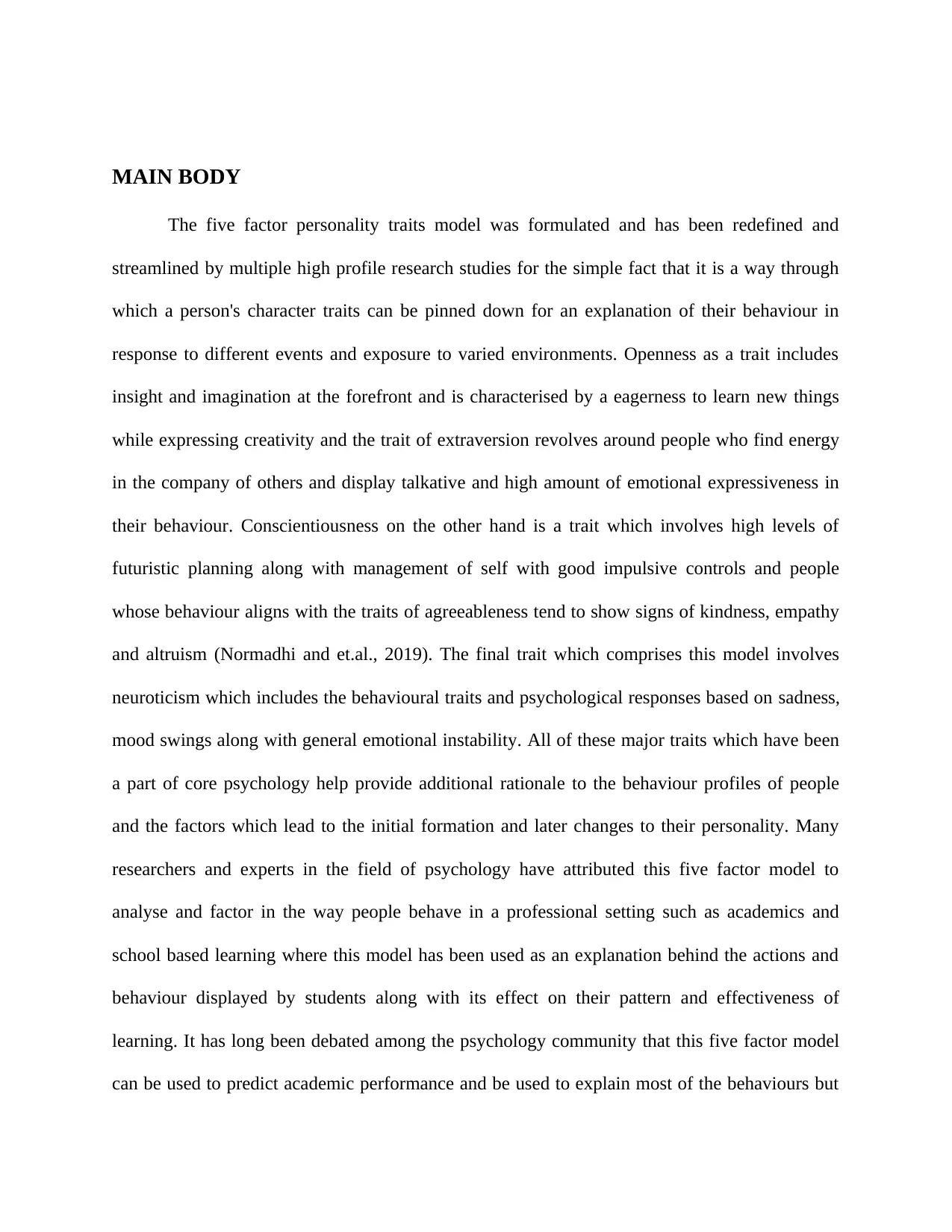
MAIN BODY
The five factor personality traits model was formulated and has been redefined and
streamlined by multiple high profile research studies for the simple fact that it is a way through
which a person's character traits can be pinned down for an explanation of their behaviour in
response to different events and exposure to varied environments. Openness as a trait includes
insight and imagination at the forefront and is characterised by a eagerness to learn new things
while expressing creativity and the trait of extraversion revolves around people who find energy
in the company of others and display talkative and high amount of emotional expressiveness in
their behaviour. Conscientiousness on the other hand is a trait which involves high levels of
futuristic planning along with management of self with good impulsive controls and people
whose behaviour aligns with the traits of agreeableness tend to show signs of kindness, empathy
and altruism (Normadhi and et.al., 2019). The final trait which comprises this model involves
neuroticism which includes the behavioural traits and psychological responses based on sadness,
mood swings along with general emotional instability. All of these major traits which have been
a part of core psychology help provide additional rationale to the behaviour profiles of people
and the factors which lead to the initial formation and later changes to their personality. Many
researchers and experts in the field of psychology have attributed this five factor model to
analyse and factor in the way people behave in a professional setting such as academics and
school based learning where this model has been used as an explanation behind the actions and
behaviour displayed by students along with its effect on their pattern and effectiveness of
learning. It has long been debated among the psychology community that this five factor model
can be used to predict academic performance and be used to explain most of the behaviours but
The five factor personality traits model was formulated and has been redefined and
streamlined by multiple high profile research studies for the simple fact that it is a way through
which a person's character traits can be pinned down for an explanation of their behaviour in
response to different events and exposure to varied environments. Openness as a trait includes
insight and imagination at the forefront and is characterised by a eagerness to learn new things
while expressing creativity and the trait of extraversion revolves around people who find energy
in the company of others and display talkative and high amount of emotional expressiveness in
their behaviour. Conscientiousness on the other hand is a trait which involves high levels of
futuristic planning along with management of self with good impulsive controls and people
whose behaviour aligns with the traits of agreeableness tend to show signs of kindness, empathy
and altruism (Normadhi and et.al., 2019). The final trait which comprises this model involves
neuroticism which includes the behavioural traits and psychological responses based on sadness,
mood swings along with general emotional instability. All of these major traits which have been
a part of core psychology help provide additional rationale to the behaviour profiles of people
and the factors which lead to the initial formation and later changes to their personality. Many
researchers and experts in the field of psychology have attributed this five factor model to
analyse and factor in the way people behave in a professional setting such as academics and
school based learning where this model has been used as an explanation behind the actions and
behaviour displayed by students along with its effect on their pattern and effectiveness of
learning. It has long been debated among the psychology community that this five factor model
can be used to predict academic performance and be used to explain most of the behaviours but
Paraphrase This Document
Need a fresh take? Get an instant paraphrase of this document with our AI Paraphraser
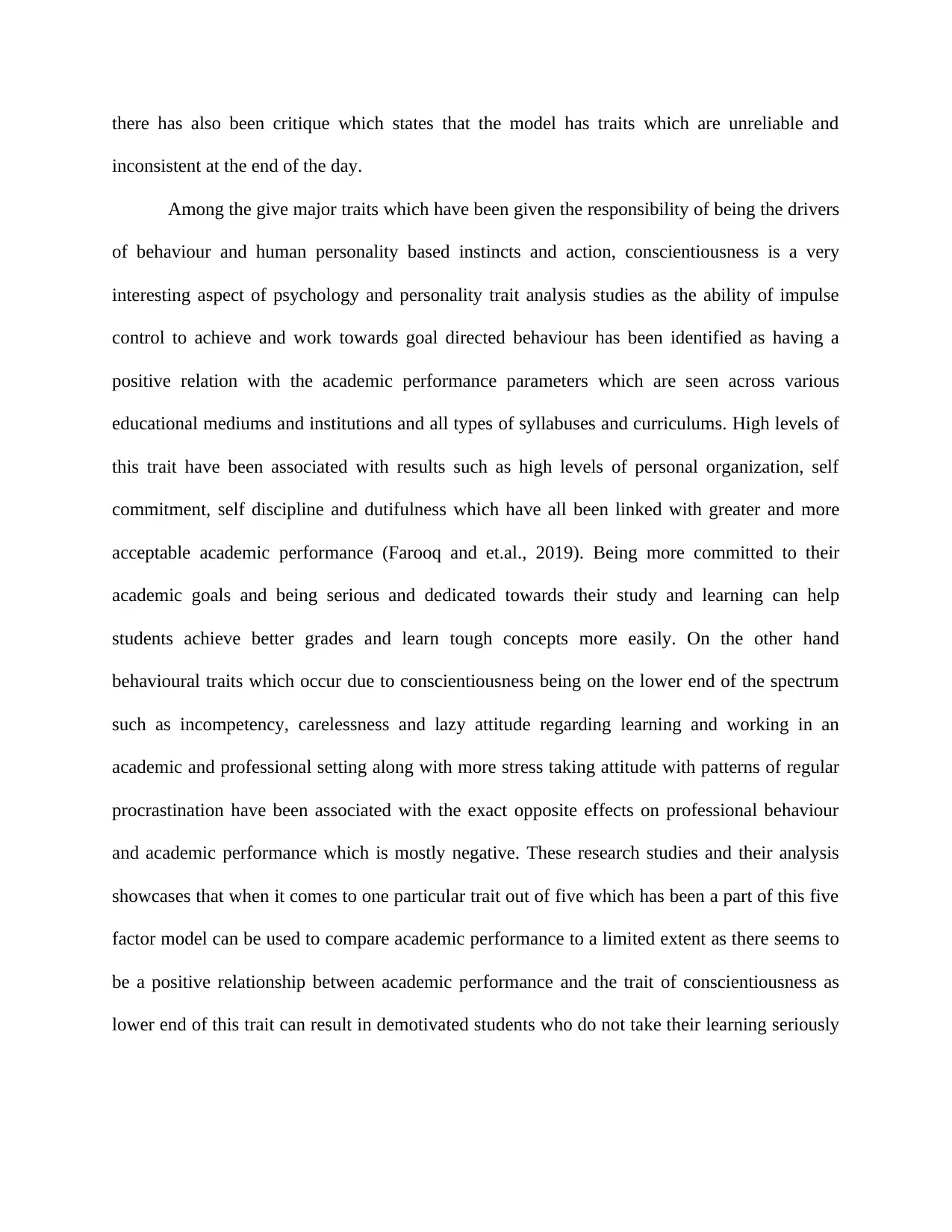
there has also been critique which states that the model has traits which are unreliable and
inconsistent at the end of the day.
Among the give major traits which have been given the responsibility of being the drivers
of behaviour and human personality based instincts and action, conscientiousness is a very
interesting aspect of psychology and personality trait analysis studies as the ability of impulse
control to achieve and work towards goal directed behaviour has been identified as having a
positive relation with the academic performance parameters which are seen across various
educational mediums and institutions and all types of syllabuses and curriculums. High levels of
this trait have been associated with results such as high levels of personal organization, self
commitment, self discipline and dutifulness which have all been linked with greater and more
acceptable academic performance (Farooq and et.al., 2019). Being more committed to their
academic goals and being serious and dedicated towards their study and learning can help
students achieve better grades and learn tough concepts more easily. On the other hand
behavioural traits which occur due to conscientiousness being on the lower end of the spectrum
such as incompetency, carelessness and lazy attitude regarding learning and working in an
academic and professional setting along with more stress taking attitude with patterns of regular
procrastination have been associated with the exact opposite effects on professional behaviour
and academic performance which is mostly negative. These research studies and their analysis
showcases that when it comes to one particular trait out of five which has been a part of this five
factor model can be used to compare academic performance to a limited extent as there seems to
be a positive relationship between academic performance and the trait of conscientiousness as
lower end of this trait can result in demotivated students who do not take their learning seriously
inconsistent at the end of the day.
Among the give major traits which have been given the responsibility of being the drivers
of behaviour and human personality based instincts and action, conscientiousness is a very
interesting aspect of psychology and personality trait analysis studies as the ability of impulse
control to achieve and work towards goal directed behaviour has been identified as having a
positive relation with the academic performance parameters which are seen across various
educational mediums and institutions and all types of syllabuses and curriculums. High levels of
this trait have been associated with results such as high levels of personal organization, self
commitment, self discipline and dutifulness which have all been linked with greater and more
acceptable academic performance (Farooq and et.al., 2019). Being more committed to their
academic goals and being serious and dedicated towards their study and learning can help
students achieve better grades and learn tough concepts more easily. On the other hand
behavioural traits which occur due to conscientiousness being on the lower end of the spectrum
such as incompetency, carelessness and lazy attitude regarding learning and working in an
academic and professional setting along with more stress taking attitude with patterns of regular
procrastination have been associated with the exact opposite effects on professional behaviour
and academic performance which is mostly negative. These research studies and their analysis
showcases that when it comes to one particular trait out of five which has been a part of this five
factor model can be used to compare academic performance to a limited extent as there seems to
be a positive relationship between academic performance and the trait of conscientiousness as
lower end of this trait can result in demotivated students who do not take their learning seriously
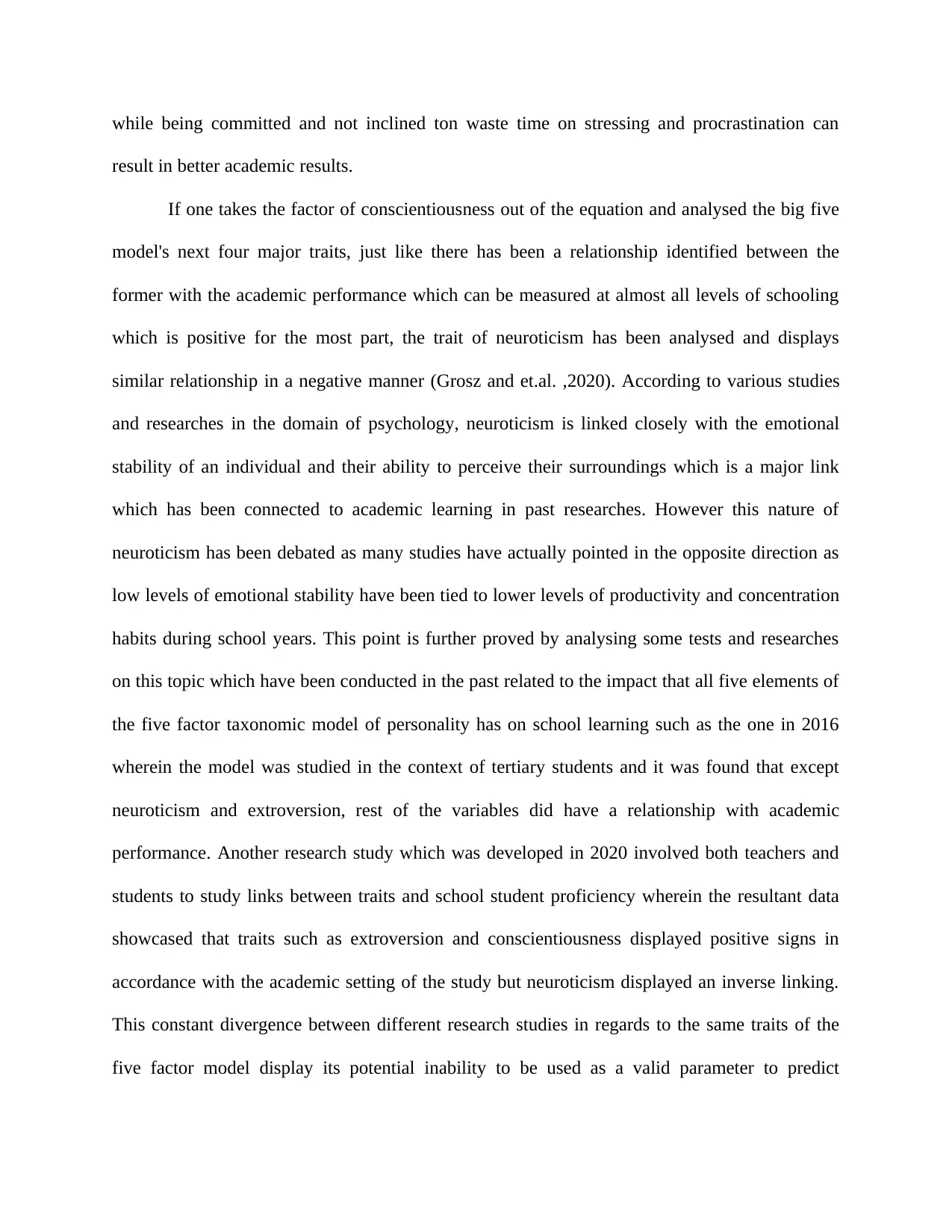
while being committed and not inclined ton waste time on stressing and procrastination can
result in better academic results.
If one takes the factor of conscientiousness out of the equation and analysed the big five
model's next four major traits, just like there has been a relationship identified between the
former with the academic performance which can be measured at almost all levels of schooling
which is positive for the most part, the trait of neuroticism has been analysed and displays
similar relationship in a negative manner (Grosz and et.al. ,2020). According to various studies
and researches in the domain of psychology, neuroticism is linked closely with the emotional
stability of an individual and their ability to perceive their surroundings which is a major link
which has been connected to academic learning in past researches. However this nature of
neuroticism has been debated as many studies have actually pointed in the opposite direction as
low levels of emotional stability have been tied to lower levels of productivity and concentration
habits during school years. This point is further proved by analysing some tests and researches
on this topic which have been conducted in the past related to the impact that all five elements of
the five factor taxonomic model of personality has on school learning such as the one in 2016
wherein the model was studied in the context of tertiary students and it was found that except
neuroticism and extroversion, rest of the variables did have a relationship with academic
performance. Another research study which was developed in 2020 involved both teachers and
students to study links between traits and school student proficiency wherein the resultant data
showcased that traits such as extroversion and conscientiousness displayed positive signs in
accordance with the academic setting of the study but neuroticism displayed an inverse linking.
This constant divergence between different research studies in regards to the same traits of the
five factor model display its potential inability to be used as a valid parameter to predict
result in better academic results.
If one takes the factor of conscientiousness out of the equation and analysed the big five
model's next four major traits, just like there has been a relationship identified between the
former with the academic performance which can be measured at almost all levels of schooling
which is positive for the most part, the trait of neuroticism has been analysed and displays
similar relationship in a negative manner (Grosz and et.al. ,2020). According to various studies
and researches in the domain of psychology, neuroticism is linked closely with the emotional
stability of an individual and their ability to perceive their surroundings which is a major link
which has been connected to academic learning in past researches. However this nature of
neuroticism has been debated as many studies have actually pointed in the opposite direction as
low levels of emotional stability have been tied to lower levels of productivity and concentration
habits during school years. This point is further proved by analysing some tests and researches
on this topic which have been conducted in the past related to the impact that all five elements of
the five factor taxonomic model of personality has on school learning such as the one in 2016
wherein the model was studied in the context of tertiary students and it was found that except
neuroticism and extroversion, rest of the variables did have a relationship with academic
performance. Another research study which was developed in 2020 involved both teachers and
students to study links between traits and school student proficiency wherein the resultant data
showcased that traits such as extroversion and conscientiousness displayed positive signs in
accordance with the academic setting of the study but neuroticism displayed an inverse linking.
This constant divergence between different research studies in regards to the same traits of the
five factor model display its potential inability to be used as a valid parameter to predict
⊘ This is a preview!⊘
Do you want full access?
Subscribe today to unlock all pages.

Trusted by 1+ million students worldwide
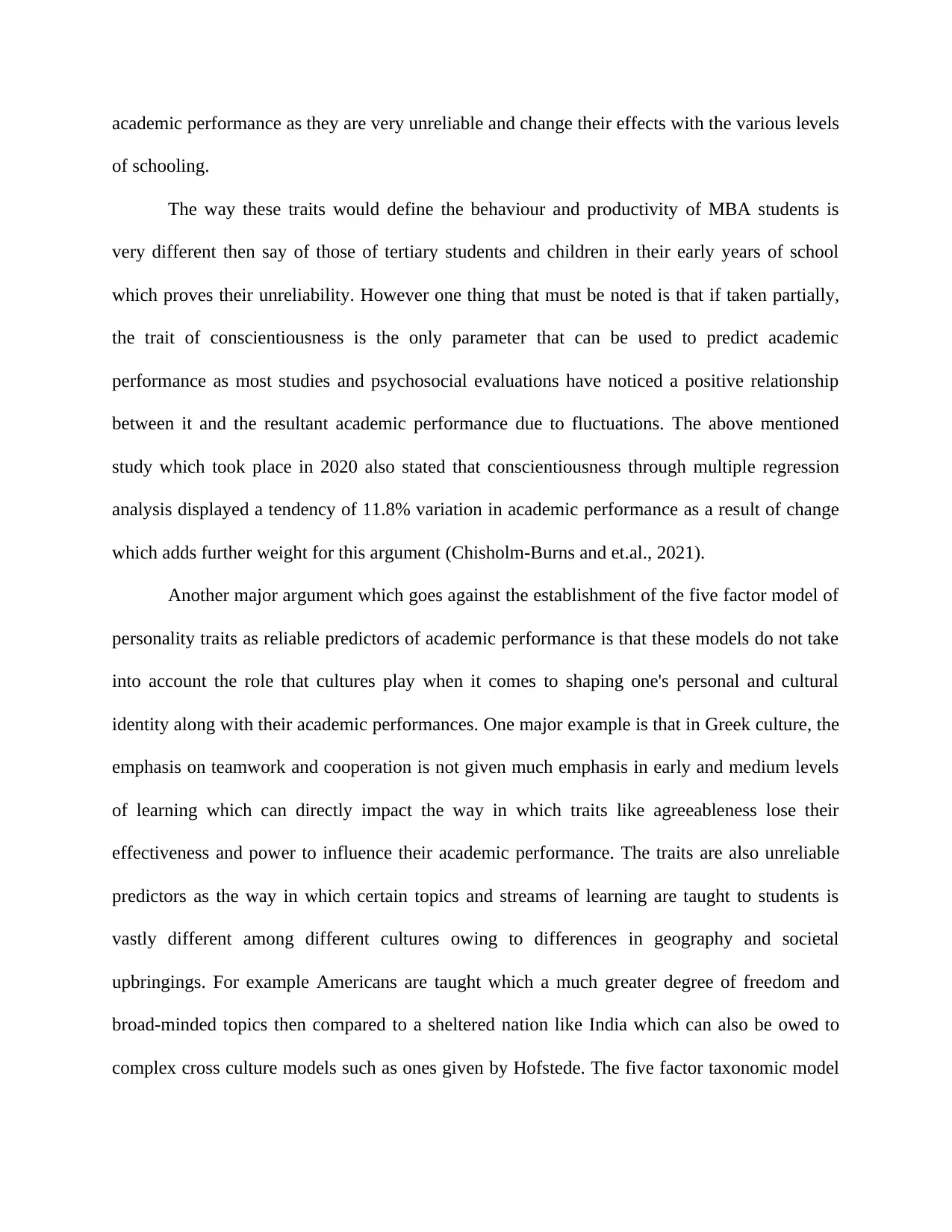
academic performance as they are very unreliable and change their effects with the various levels
of schooling.
The way these traits would define the behaviour and productivity of MBA students is
very different then say of those of tertiary students and children in their early years of school
which proves their unreliability. However one thing that must be noted is that if taken partially,
the trait of conscientiousness is the only parameter that can be used to predict academic
performance as most studies and psychosocial evaluations have noticed a positive relationship
between it and the resultant academic performance due to fluctuations. The above mentioned
study which took place in 2020 also stated that conscientiousness through multiple regression
analysis displayed a tendency of 11.8% variation in academic performance as a result of change
which adds further weight for this argument (Chisholm-Burns and et.al., 2021).
Another major argument which goes against the establishment of the five factor model of
personality traits as reliable predictors of academic performance is that these models do not take
into account the role that cultures play when it comes to shaping one's personal and cultural
identity along with their academic performances. One major example is that in Greek culture, the
emphasis on teamwork and cooperation is not given much emphasis in early and medium levels
of learning which can directly impact the way in which traits like agreeableness lose their
effectiveness and power to influence their academic performance. The traits are also unreliable
predictors as the way in which certain topics and streams of learning are taught to students is
vastly different among different cultures owing to differences in geography and societal
upbringings. For example Americans are taught which a much greater degree of freedom and
broad-minded topics then compared to a sheltered nation like India which can also be owed to
complex cross culture models such as ones given by Hofstede. The five factor taxonomic model
of schooling.
The way these traits would define the behaviour and productivity of MBA students is
very different then say of those of tertiary students and children in their early years of school
which proves their unreliability. However one thing that must be noted is that if taken partially,
the trait of conscientiousness is the only parameter that can be used to predict academic
performance as most studies and psychosocial evaluations have noticed a positive relationship
between it and the resultant academic performance due to fluctuations. The above mentioned
study which took place in 2020 also stated that conscientiousness through multiple regression
analysis displayed a tendency of 11.8% variation in academic performance as a result of change
which adds further weight for this argument (Chisholm-Burns and et.al., 2021).
Another major argument which goes against the establishment of the five factor model of
personality traits as reliable predictors of academic performance is that these models do not take
into account the role that cultures play when it comes to shaping one's personal and cultural
identity along with their academic performances. One major example is that in Greek culture, the
emphasis on teamwork and cooperation is not given much emphasis in early and medium levels
of learning which can directly impact the way in which traits like agreeableness lose their
effectiveness and power to influence their academic performance. The traits are also unreliable
predictors as the way in which certain topics and streams of learning are taught to students is
vastly different among different cultures owing to differences in geography and societal
upbringings. For example Americans are taught which a much greater degree of freedom and
broad-minded topics then compared to a sheltered nation like India which can also be owed to
complex cross culture models such as ones given by Hofstede. The five factor taxonomic model
Paraphrase This Document
Need a fresh take? Get an instant paraphrase of this document with our AI Paraphraser
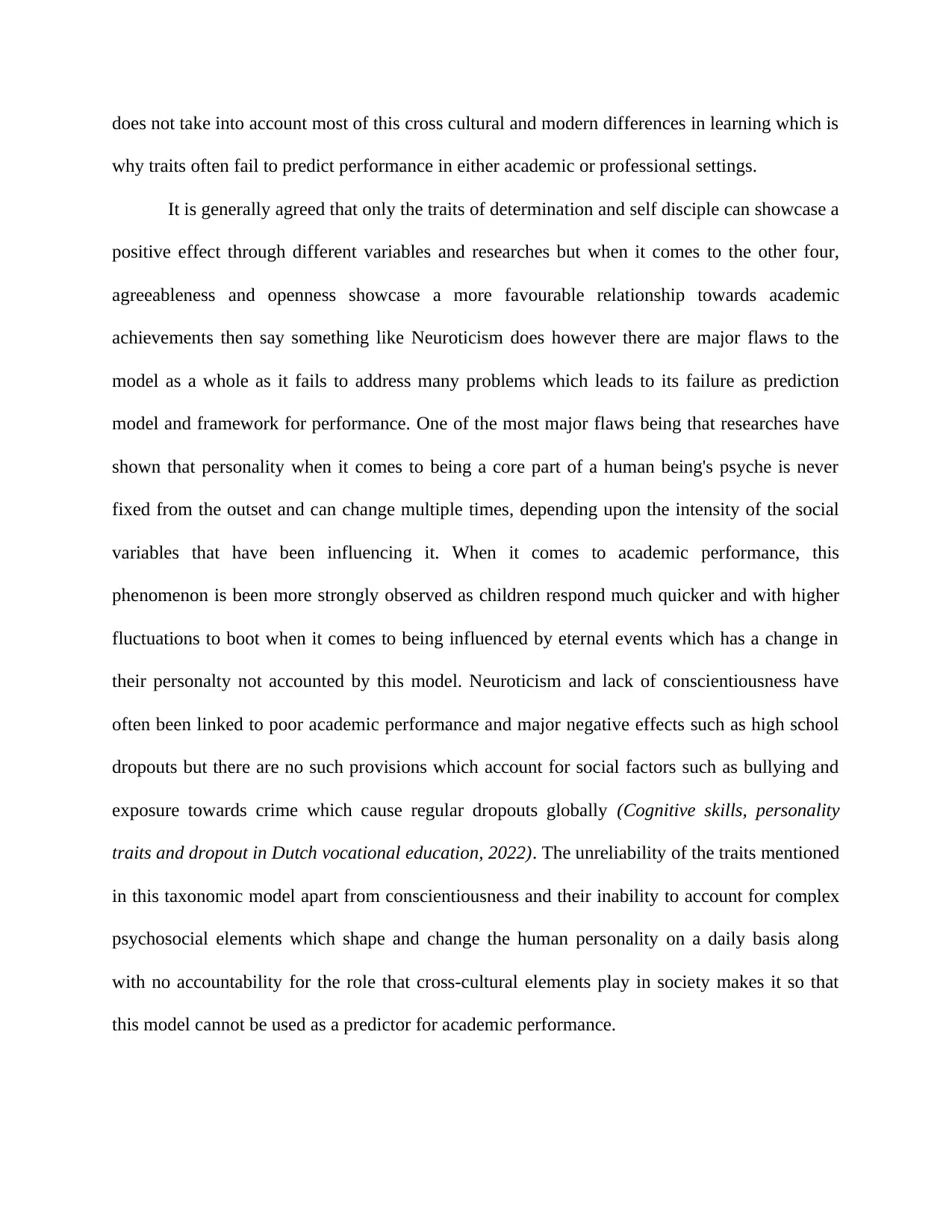
does not take into account most of this cross cultural and modern differences in learning which is
why traits often fail to predict performance in either academic or professional settings.
It is generally agreed that only the traits of determination and self disciple can showcase a
positive effect through different variables and researches but when it comes to the other four,
agreeableness and openness showcase a more favourable relationship towards academic
achievements then say something like Neuroticism does however there are major flaws to the
model as a whole as it fails to address many problems which leads to its failure as prediction
model and framework for performance. One of the most major flaws being that researches have
shown that personality when it comes to being a core part of a human being's psyche is never
fixed from the outset and can change multiple times, depending upon the intensity of the social
variables that have been influencing it. When it comes to academic performance, this
phenomenon is been more strongly observed as children respond much quicker and with higher
fluctuations to boot when it comes to being influenced by eternal events which has a change in
their personalty not accounted by this model. Neuroticism and lack of conscientiousness have
often been linked to poor academic performance and major negative effects such as high school
dropouts but there are no such provisions which account for social factors such as bullying and
exposure towards crime which cause regular dropouts globally (Cognitive skills, personality
traits and dropout in Dutch vocational education, 2022). The unreliability of the traits mentioned
in this taxonomic model apart from conscientiousness and their inability to account for complex
psychosocial elements which shape and change the human personality on a daily basis along
with no accountability for the role that cross-cultural elements play in society makes it so that
this model cannot be used as a predictor for academic performance.
why traits often fail to predict performance in either academic or professional settings.
It is generally agreed that only the traits of determination and self disciple can showcase a
positive effect through different variables and researches but when it comes to the other four,
agreeableness and openness showcase a more favourable relationship towards academic
achievements then say something like Neuroticism does however there are major flaws to the
model as a whole as it fails to address many problems which leads to its failure as prediction
model and framework for performance. One of the most major flaws being that researches have
shown that personality when it comes to being a core part of a human being's psyche is never
fixed from the outset and can change multiple times, depending upon the intensity of the social
variables that have been influencing it. When it comes to academic performance, this
phenomenon is been more strongly observed as children respond much quicker and with higher
fluctuations to boot when it comes to being influenced by eternal events which has a change in
their personalty not accounted by this model. Neuroticism and lack of conscientiousness have
often been linked to poor academic performance and major negative effects such as high school
dropouts but there are no such provisions which account for social factors such as bullying and
exposure towards crime which cause regular dropouts globally (Cognitive skills, personality
traits and dropout in Dutch vocational education, 2022). The unreliability of the traits mentioned
in this taxonomic model apart from conscientiousness and their inability to account for complex
psychosocial elements which shape and change the human personality on a daily basis along
with no accountability for the role that cross-cultural elements play in society makes it so that
this model cannot be used as a predictor for academic performance.
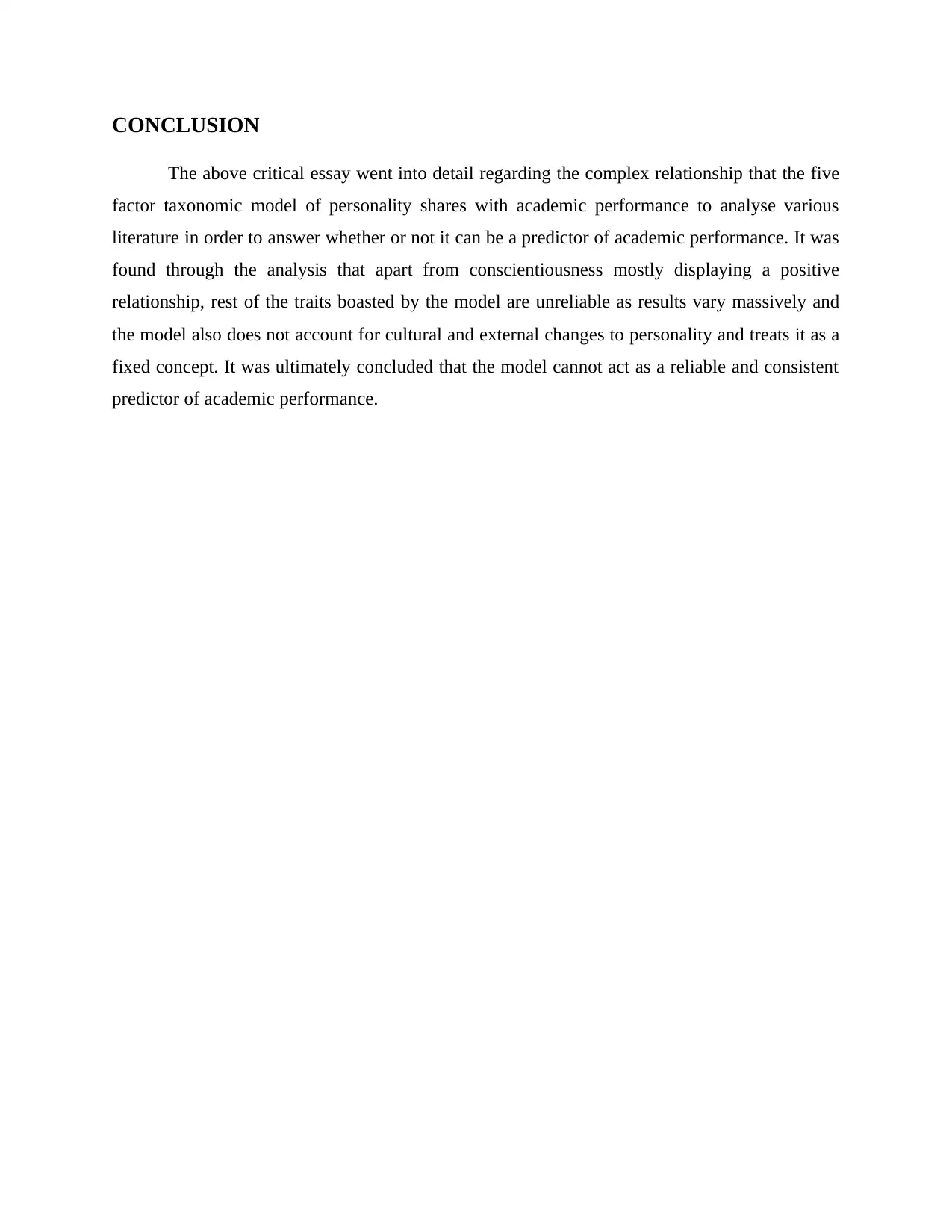
CONCLUSION
The above critical essay went into detail regarding the complex relationship that the five
factor taxonomic model of personality shares with academic performance to analyse various
literature in order to answer whether or not it can be a predictor of academic performance. It was
found through the analysis that apart from conscientiousness mostly displaying a positive
relationship, rest of the traits boasted by the model are unreliable as results vary massively and
the model also does not account for cultural and external changes to personality and treats it as a
fixed concept. It was ultimately concluded that the model cannot act as a reliable and consistent
predictor of academic performance.
The above critical essay went into detail regarding the complex relationship that the five
factor taxonomic model of personality shares with academic performance to analyse various
literature in order to answer whether or not it can be a predictor of academic performance. It was
found through the analysis that apart from conscientiousness mostly displaying a positive
relationship, rest of the traits boasted by the model are unreliable as results vary massively and
the model also does not account for cultural and external changes to personality and treats it as a
fixed concept. It was ultimately concluded that the model cannot act as a reliable and consistent
predictor of academic performance.
⊘ This is a preview!⊘
Do you want full access?
Subscribe today to unlock all pages.

Trusted by 1+ million students worldwide
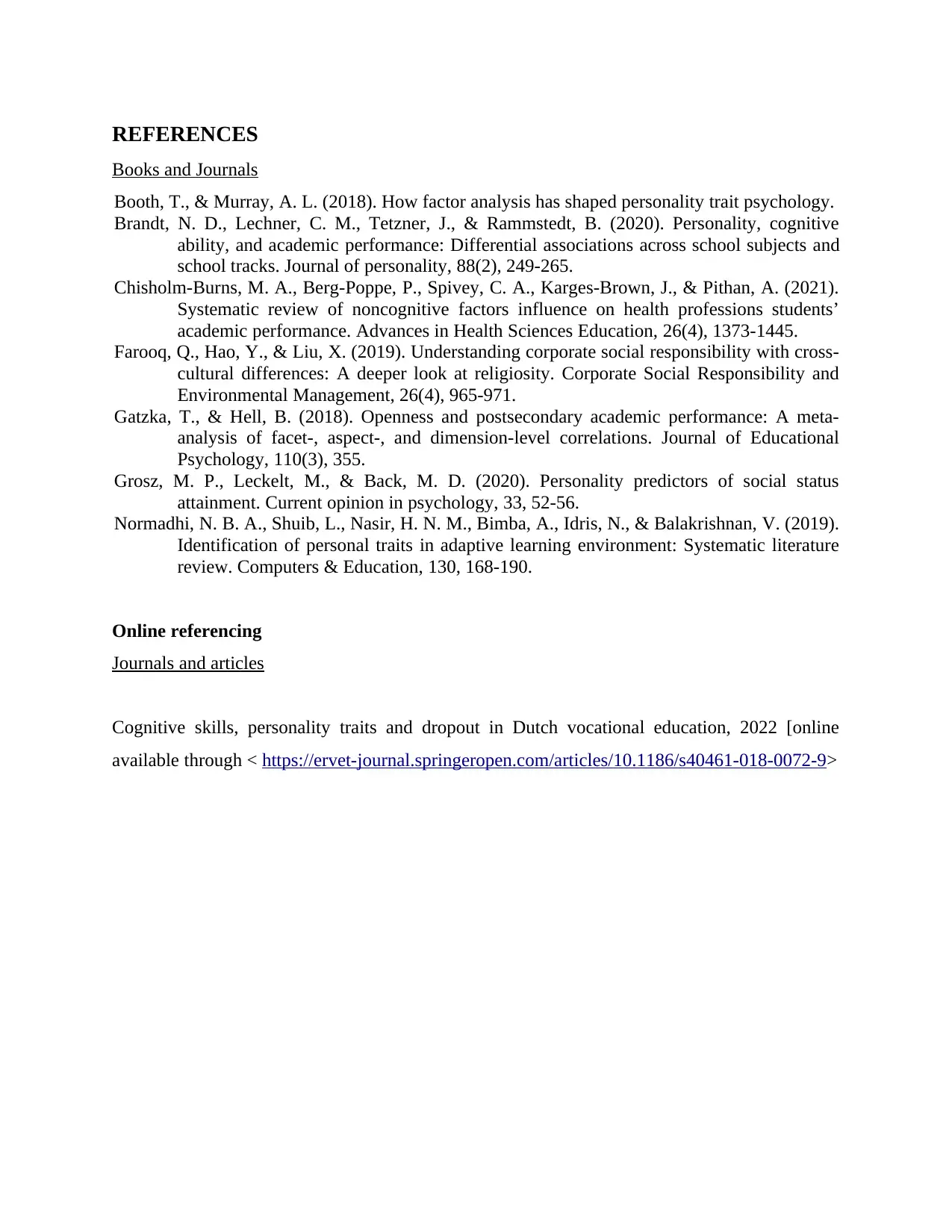
REFERENCES
Books and Journals
Booth, T., & Murray, A. L. (2018). How factor analysis has shaped personality trait psychology.
Brandt, N. D., Lechner, C. M., Tetzner, J., & Rammstedt, B. (2020). Personality, cognitive
ability, and academic performance: Differential associations across school subjects and
school tracks. Journal of personality, 88(2), 249-265.
Chisholm-Burns, M. A., Berg-Poppe, P., Spivey, C. A., Karges-Brown, J., & Pithan, A. (2021).
Systematic review of noncognitive factors influence on health professions students’
academic performance. Advances in Health Sciences Education, 26(4), 1373-1445.
Farooq, Q., Hao, Y., & Liu, X. (2019). Understanding corporate social responsibility with cross‐
cultural differences: A deeper look at religiosity. Corporate Social Responsibility and
Environmental Management, 26(4), 965-971.
Gatzka, T., & Hell, B. (2018). Openness and postsecondary academic performance: A meta-
analysis of facet-, aspect-, and dimension-level correlations. Journal of Educational
Psychology, 110(3), 355.
Grosz, M. P., Leckelt, M., & Back, M. D. (2020). Personality predictors of social status
attainment. Current opinion in psychology, 33, 52-56.
Normadhi, N. B. A., Shuib, L., Nasir, H. N. M., Bimba, A., Idris, N., & Balakrishnan, V. (2019).
Identification of personal traits in adaptive learning environment: Systematic literature
review. Computers & Education, 130, 168-190.
Online referencing
Journals and articles
Cognitive skills, personality traits and dropout in Dutch vocational education, 2022 [online
available through < https://ervet-journal.springeropen.com/articles/10.1186/s40461-018-0072-9>
Books and Journals
Booth, T., & Murray, A. L. (2018). How factor analysis has shaped personality trait psychology.
Brandt, N. D., Lechner, C. M., Tetzner, J., & Rammstedt, B. (2020). Personality, cognitive
ability, and academic performance: Differential associations across school subjects and
school tracks. Journal of personality, 88(2), 249-265.
Chisholm-Burns, M. A., Berg-Poppe, P., Spivey, C. A., Karges-Brown, J., & Pithan, A. (2021).
Systematic review of noncognitive factors influence on health professions students’
academic performance. Advances in Health Sciences Education, 26(4), 1373-1445.
Farooq, Q., Hao, Y., & Liu, X. (2019). Understanding corporate social responsibility with cross‐
cultural differences: A deeper look at religiosity. Corporate Social Responsibility and
Environmental Management, 26(4), 965-971.
Gatzka, T., & Hell, B. (2018). Openness and postsecondary academic performance: A meta-
analysis of facet-, aspect-, and dimension-level correlations. Journal of Educational
Psychology, 110(3), 355.
Grosz, M. P., Leckelt, M., & Back, M. D. (2020). Personality predictors of social status
attainment. Current opinion in psychology, 33, 52-56.
Normadhi, N. B. A., Shuib, L., Nasir, H. N. M., Bimba, A., Idris, N., & Balakrishnan, V. (2019).
Identification of personal traits in adaptive learning environment: Systematic literature
review. Computers & Education, 130, 168-190.
Online referencing
Journals and articles
Cognitive skills, personality traits and dropout in Dutch vocational education, 2022 [online
available through < https://ervet-journal.springeropen.com/articles/10.1186/s40461-018-0072-9>
1 out of 10
Related Documents
Your All-in-One AI-Powered Toolkit for Academic Success.
+13062052269
info@desklib.com
Available 24*7 on WhatsApp / Email
![[object Object]](/_next/static/media/star-bottom.7253800d.svg)
Unlock your academic potential
Copyright © 2020–2026 A2Z Services. All Rights Reserved. Developed and managed by ZUCOL.





